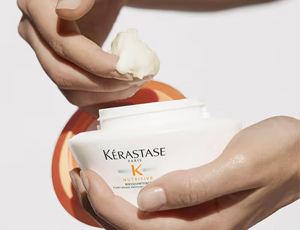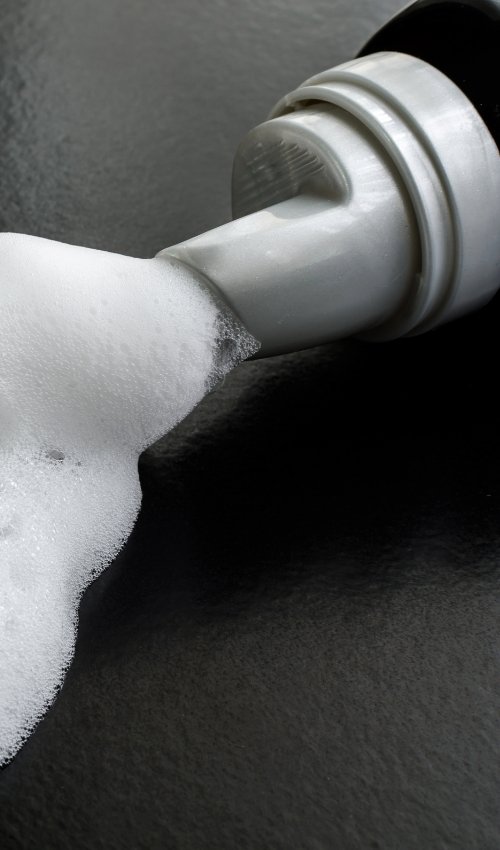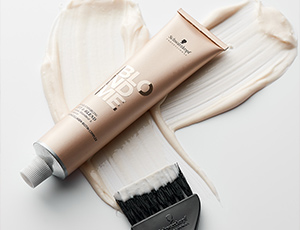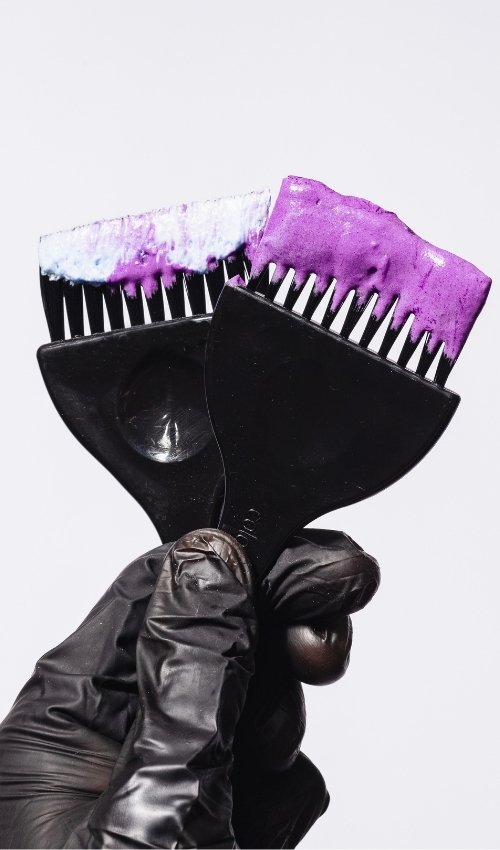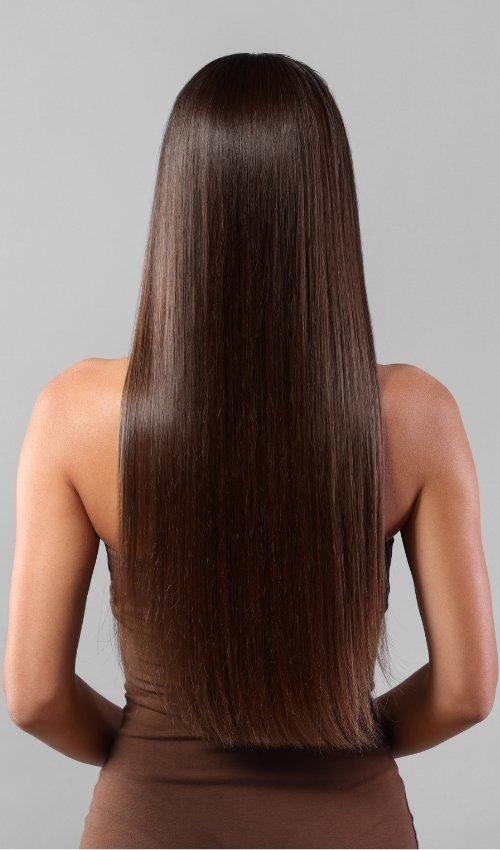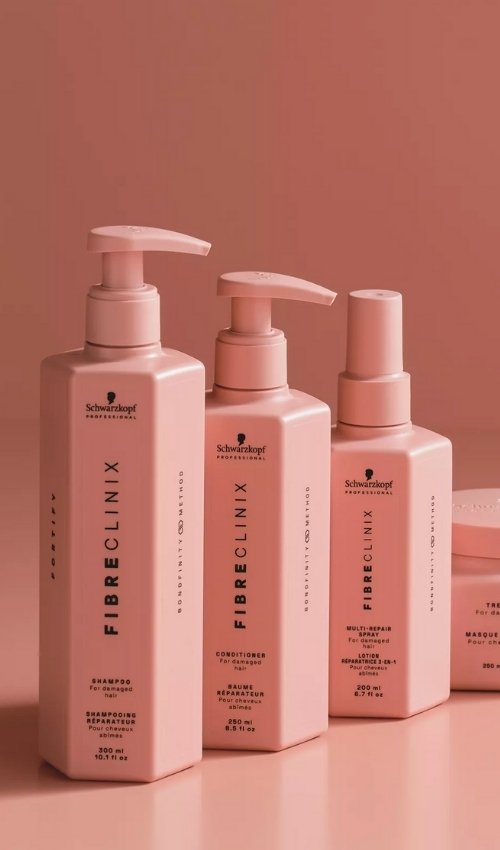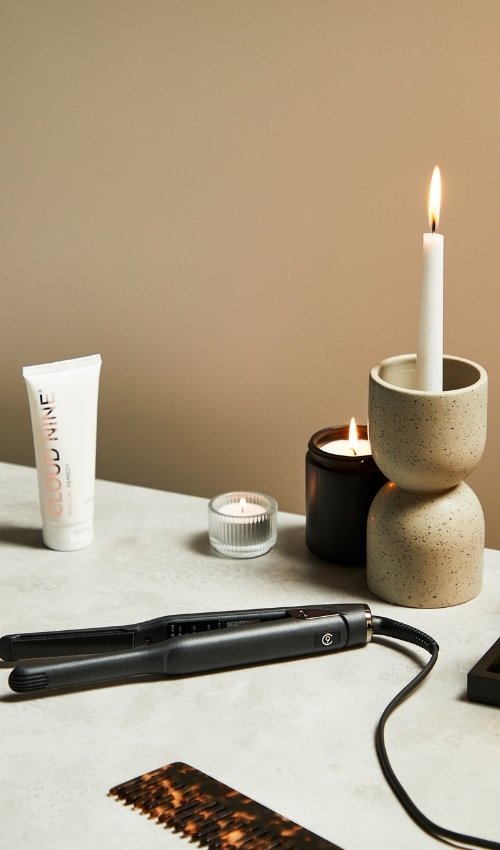Rosemary for hair might be the natural miracle remedy many are searching for. In fact, studies show that 82 percent of male participants experienced a reduction in hair loss after six months of using rosemary water. It's no surprise that rosemary was named Medicinal Plant of the Year in 2011!
What makes this plant so special? The essential oils such as camphor, carnosol, cineole, and borneol stimulate blood circulation and thereby promote hair growth. Additionally, rosemary oil can be just as effective as synthetic ingredients like minoxidil – but with fewer skin irritations. For our daily hair care, rosemary offers versatile application possibilities, whether as rosemary water or rosemary oil.
In this article, we’ll learn all about:
- The scientifically proven effects of rosemary on hair growth
- The difference between rosemary oil and rosemary water
- Practical application tips for various hair problems
- A step-by-step guide to making your own rosemary water
- The necessary duration of use for visible results
🔄 Are you suffering from hair loss?
Discover our most popular products against hair loss at clickandcare.ch – for naturally full hair, without compromise.
👉 View Products
What makes rosemary so special for hair?
The modest medicinal plant from the Mediterranean is revolutionizing hair care – and for good reason! Rosemary has been valued for centuries in various cultures for its medical and cosmetic benefits. What this small plant can do for our hair is astonishing:
- Stimulates blood circulation in the scalp and activates hair follicles
- Proven to combat hair loss (comparable to minoxidil)
- Reduces dandruff and scalp itching
- Strengthens hair roots and adds shine
- Regulates sebum production and prevents greasy buildup
An overview of key ingredients
Rosemary contains an impressive combination of active substances. Especially notable are the essential oils (around 2.5 percent) like cineole, camphor, and borneol [1]. These are responsible for its invigorating and circulation-promoting effects. The plant also contains about 8 percent tannins, which have a soothing effect on the scalp [1].
Additionally, rosemary scores points with valuable antioxidants like carnosic acid. This not only protects against free radicals that can damage hair follicles, but also improves tissue healing and skin cell renewal [2]. This complex of active ingredients is further enhanced by flavonoids, glycolic acid, bitter substances, saponins, and resins [1].
How rosemary stimulates the scalp
The main mechanism of action of rosemary lies in its ability to stimulate blood flow to the scalp. This improves the supply of nutrients and oxygen to hair follicles – two crucial factors for strong and healthy hair growth [3]. Rosemary oil also has anti-inflammatory and antimicrobial effects, which help with flaky or itchy scalp conditions [4].
Interestingly, rosemary can also regulate the production of dihydrotestosterone (DHT) – a hormone commonly linked to hereditary hair loss [3]. This explains why rosemary may be particularly effective for genetically related hair loss.
What does rosemary really do for your hair?
A remarkable 2015 study compared the effects of rosemary oil with minoxidil, a common treatment for hair loss. After six months of topical application, both groups showed a significant increase in hair count [2]. Notably, the participants using rosemary oil reported far fewer skin irritations than those using minoxidil [2].
Another study confirmed that 82 percent of male participants noticed a reduction in hair loss after six months of use [5]. 38 percent even reported noticeable hair regrowth [5].
Furthermore, rosemary has been shown to positively affect:
- Reduction of dandruff by balancing the scalp [1]
- Strengthening of the hair shaft and improving shine [6]
- Regulation of sebum production in oily hair [7]
However, patience is key – visible improvements typically appear only after several months of consistent use [8].
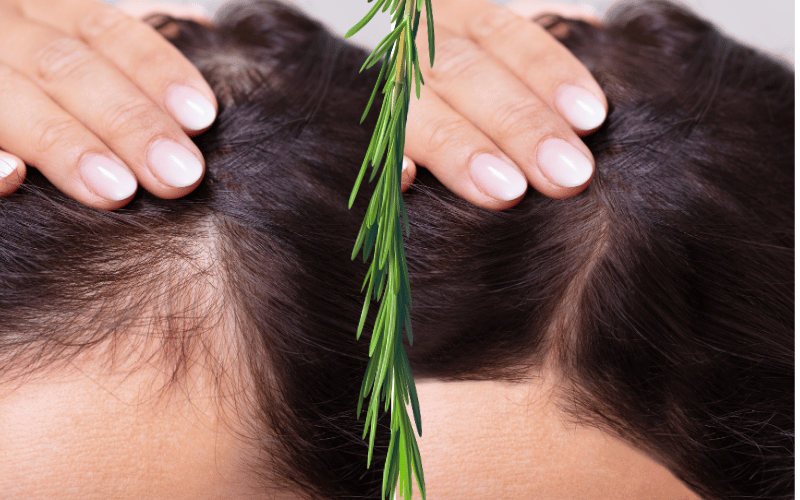
Rosemary Oil and Rosemary Water: Effects and Differences
When choosing between the two most popular rosemary applications for hair, we face an important decision: Should it be the concentrated rosemary oil or the milder rosemary water? Both forms offer remarkable benefits for hair and scalp, but they differ significantly in application and effect.
Here are the key differences at a glance:
- Rosemary oil: Highly concentrated, very effective, must be diluted
- Rosemary water: Milder, easier to apply, leaves no residue
- Effect: Both promote hair growth, but with varying intensity
Rosemary Oil for Hair: Benefits and Risks
Rosemary oil is a highly concentrated essential oil with an intense aroma. Its strength lies in the concentration of its active compounds – thanks to carnosic acid, it supports tissue healing and skin cell regeneration, which in turn boosts circulation. This can prevent hair loss or even stimulate new hair growth [9].
However, caution is advised when applying it: Rosemary oil should never be applied undiluted to the scalp [10]. It must always be mixed with a carrier oil such as jojoba, almond, or olive oil to avoid skin irritation [11]. A simple recipe: mix 3–5 drops of rosemary oil with one tablespoon of carrier oil and gently massage into the scalp for 5–10 minutes [12].
Our Product Recommendations with Rosemary Oil
If you prefer not to mix it yourself, we offer high-quality rosemary products for daily use. These products contain powerful botanical ingredients – ideal for gentle yet effective care for hair loss or sensitive scalps:
Louis Philipp Constant Care Shampoo
Description: Gentle, nourishing shampoo – perfect to use after a rosemary oil treatment. Especially suitable for sensitive or stressed scalps.NEQI Smooth Strength Rosemary Oil – 75ml
Description: Pure, luxurious rosemary oil for scalp massages and intensive care treatments. Ideal for hair loss or to stimulate hair growth.
BLUE Body Hand & Body Wash with Rosemary – 500ml
Description: Holistic care with rosemary – for body and mind. Perfectly complements your hair care routine.
🔄 Don’t want to waste time?
Discover our most popular rosemary products now at clickandcare.ch – for naturally beautiful hair, without compromise.
👉 View Products
Rosemary Water: Gentle Care with Long-Term Effects
Rosemary water, on the other hand, is the milder alternative. It has a subtle scent and a lower concentration of active ingredients [13]. The big advantage: it's non-oily and doesn’t make hair greasy, making it ideal as a leave-in treatment [13].
Although rosemary water is more diluted than the oil and may therefore be less intense [14], it can still effectively promote hair growth with regular use [5]. Additionally, it works very well as an overnight treatment, especially under a sleep cap [15].
Which is Better: Rosemary Oil or Rosemary Water?
The choice between the two products ultimately depends on your personal needs and hair type [5].
Rosemary oil is especially suitable for:
- Dry hair that doesn’t get greasy quickly [15]
- Intensive treatments for hair loss
- Scalp massages with deep action
Rosemary water, on the other hand, is better for:
- Slightly oily hair [15]
- Daily use without rinsing
- Sensitive scalp
According to a 2015 study, rosemary oil showed similarly good results to minoxidil after six months of use in treating hereditary hair loss – but with significantly fewer scalp irritations [16]. So if you want maximum results, rosemary oil is recommended; for a gentler yet effective alternative, rosemary water is the right choice.
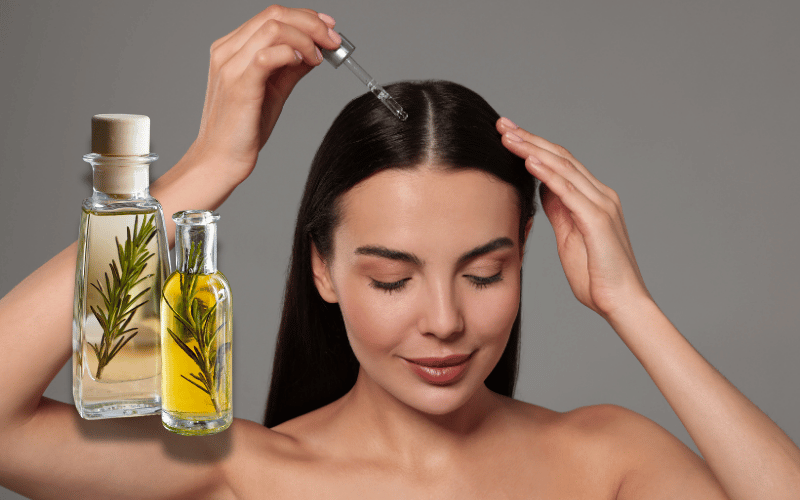
Practical Application: How to Use Rosemary Correctly
Now that we understand the theory – how do we actually incorporate rosemary into our daily hair care routine? The application possibilities are more versatile than you might think. Here’s an overview of the most important methods:
- Rosemary water as a refreshing leave-in spray
- Rosemary oil mixed with nourishing carrier oils
- Rosemary added to shampoo and conditioner
- Regular use for optimal results
- Gentle treatment for sensitive scalps
Rosemary Water as a Leave-In Spray
Rosemary water is the perfect choice for daily use. Simply pour it into a spray bottle and spritz directly onto your hair and scalp. Then gently massage it in and do not rinse. It’s especially effective when applied in the evening and covered with a cap or towel – this allows the active ingredients to penetrate deeply overnight.
Rosemary Oil Combined with Carrier Oils
Since pure rosemary oil is too strong to apply directly, it must always be diluted. A proven recipe: Mix 3–5 drops of rosemary oil with one tablespoon of carrier oil. Depending on your hair type, different carrier oils are suitable:
- For dry hair: Coconut, olive, or avocado oil
- For fine hair: Jojoba or argan oil
- For normal hair: Almond or coconut oil
Gently massage this mixture into the scalp and leave it on for at least 30 minutes.
Rosemary in Shampoo or Conditioner
A particularly simple method: Add 4–5 drops of rosemary oil to your regular shampoo or conditioner. This way, you enjoy the benefits without making your hair heavy or greasy. Let the product sit for about 1–2 minutes before rinsing it out.
How Often Should You Use Rosemary?
For optimal results, you should use rosemary products regularly. Rosemary oil treatments are recommended 2–3 times per week. Rosemary water, however, can be used daily. Important to note: Visible results typically appear only after several months of use – in studies, it took at least six months.
Tips for Sensitive Scalps
If you have a sensitive scalp, caution is advised. Be sure to do a patch test by applying a drop of the diluted mixture to the inside of your wrist and waiting 24 hours. If no reaction occurs, you can proceed with use. Start with a lower concentration (1–2 drops per tablespoon of carrier oil) and gradually increase as tolerated.
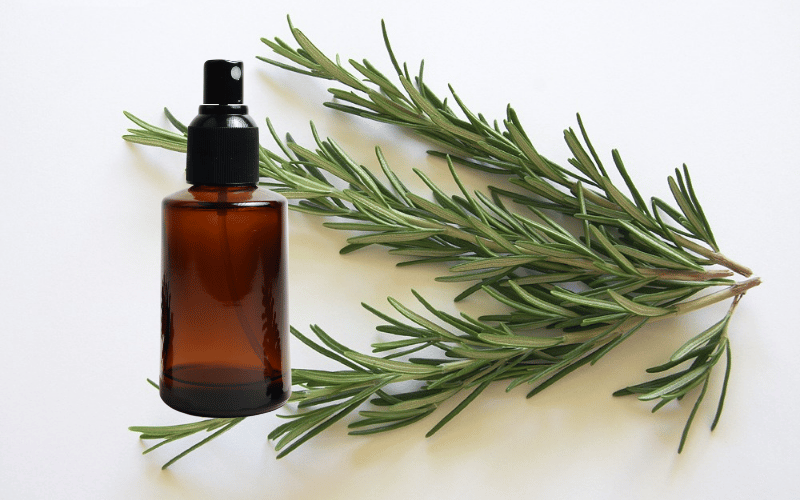
Make Your Own Rosemary Water: Step-by-Step Guide
Why buy expensive rosemary water when you can easily make it yourself? DIY rosemary water is not only cost-effective but also free of artificial additives. In this section, I’ll explain how to prepare your own rosemary water for hair:
Key Points at a Glance:
- Only two main ingredients needed: rosemary and water
- Preparation time: around 30 minutes
- Shelf life in the fridge: 1–2 weeks
- Use as a leave-in spray or rinse
Ingredients and Preparation
To make rosemary water, you’ll need:
- 5 fresh rosemary sprigs or 2–3 tablespoons of dried rosemary (preferably organic)
- 500 ml to 1 liter of water (depending on desired concentration)
- Optional: 1 teaspoon of vegetable glycerin for added moisture
- A pot with a lid
- A fine sieve or coffee filter
- A clean, sterilized spray bottle
Be sure to wash fresh rosemary sprigs thoroughly. Rosemary harvested in summer contains the most potent active ingredients.
Boiling Process and Steeping Time
- Bring the water to a boil in a pot
- Add the rosemary and simmer for 15–20 minutes on low heat
- Important: Keep the lid on the pot to retain the essential oils
- Remove from heat and allow the mixture to cool completely
- Strain the rosemary through a fine sieve or coffee filter
Alternatively, if you're short on time, you can use essential rosemary oil: just add eight drops to one liter of water and shake well.
Storage and Shelf Life
- Pour into a clean, dark spray bottle
- Store in the refrigerator (lasts 1–2 weeks)
- For longer shelf life: freeze in ice cube trays and thaw as needed
- Shake well before each use
Watch for signs of spoilage: if the rosemary water smells sour or no longer fresh, discard it.
Everyday Use
- As a leave-in spray for dry or damp hair
- Overnight treatment under a cap for deeper effects
- As a refreshing scalp massage between washes
- As an additive to your shampoo or conditioner
First test your tolerance by applying a small amount to your skin.
Conclusion: Natural Hair Care with Rosemary – A Timeless Treasure
After everything we’ve learned about rosemary for hair, one thing is clear: this humble medicinal plant offers impressive benefits for our hair care. In fact, rosemary combines powerful ingredients that are scientifically proven to support hair growth and reduce hair loss.
Particularly noteworthy is that rosemary oil has shown results comparable to synthetic minoxidil – but with significantly fewer side effects. This natural alternative is gentler on the scalp while nourishing the hair in various ways.
The choice between rosemary oil and rosemary water ultimately depends on your individual needs. While the oil is more intense and suitable for deep treatments, rosemary water offers a gentler, everyday care option without residue.
Still, patience is key. The positive effects typically appear only after consistent, long-term use. But those who stay committed are rewarded with stronger, shinier hair.
Making rosemary water yourself not only saves money, but also ensures a pure, additive-free product. Its simple preparation makes it a practical option for anyone who values natural hair care.
In conclusion: rosemary truly earned its title as Medicinal Plant of the Year 2011. Its versatile applications and proven effects make it a valuable ally for healthy, strong hair – a true natural wonder appreciated for centuries and still relevant today.
FAQs
Q1. How do you properly use rosemary water for hair?
Spray rosemary water directly onto the scalp using a spray bottle and gently massage it in. Let it sit for at least 5 minutes. It can be used as a leave-in product and does not need to be rinsed. For best results, use it regularly – for example, after every wash.
Q2. How long does it take to see results from rosemary water?
Visible results usually appear only after several months of consistent use. Studies showed that at least six months of regular application were needed to observe significant improvements in hair growth.
Q3. Is rosemary oil or rosemary water better for hair?
It depends on your needs. Rosemary oil is more concentrated and intense but must be diluted. It works well for dry hair and intensive treatments. Rosemary water is milder, easier to use, and ideal for daily application—especially for slightly oily hair or sensitive scalps.
Q4. How can you make rosemary water at home?
Boil 5 fresh rosemary sprigs or 2–3 tablespoons of dried rosemary in 500 ml to 1 liter of water for 15–20 minutes. Let it cool, strain the rosemary, and pour the water into a clean spray bottle. Store it in the fridge, where it will last 1–2 weeks.
Q5. What effect does rosemary have on hair growth?
Rosemary stimulates blood circulation in the scalp, activates the hair follicles, and can reduce hair loss. Studies show that it may be as effective as minoxidil but with fewer side effects. It also strengthens hair roots, enhances shine, and regulates oil production.
References
- Zentrum der Gesundheit – Dandruff
- Hairlust – Rosemary Oil for Hair
- Heydecke – Rosemary Water for Faster Hair Growth
- Rixin Cosmetics – How Rosemary Promotes Hair Growth
- Flaconi Magazine – Rosemary Water
- eZebra – Benefits of Rosemary Water
- VOGUE – Rosemary Oil for Hair
- Hairlust – Use and Effect
- BUNTE – DIY Rosemary Hair Water
- Hairlust – Dosage and Application
- STYLEBOOK – Rosemary Oil for Hair
- Parfumdreams – Beauty Journal
- Casida – Rosemary Water for Hair
- Hairlust – Effects of Rosemary Water
- Utopia – When DIY Rosemary Water Can Help Against Hair Loss
- MDR Wissen – Rosemary and Hair Care





